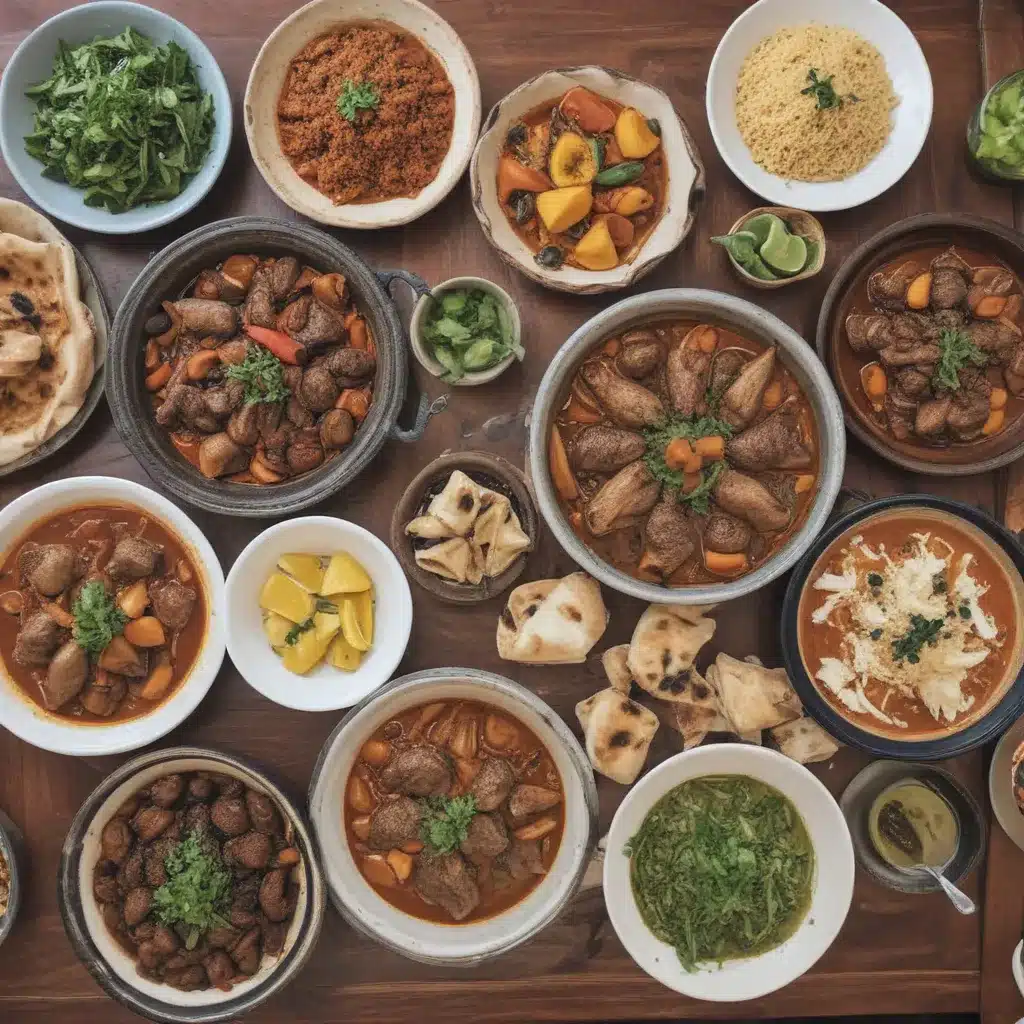
Stepping into a Culinary Oasis
As I step through the ornately carved wooden doors of El Bahia, a Moroccan restaurant nestled in the heart of New York City, I’m immediately enveloped in a warm embrace of spices, aromas, and the chatter of lively conversation. The space breathes with an air of authenticity, transporting me from the bustling streets outside to a cozy, vibrant corner of the Maghreb.
I’ve heard whispers of this place, its reputation for exceptional Moroccan cuisine preceding it, but nothing could have prepared me for the sensory experience that awaits. The walls are adorned with intricate tilework and colorful Berber rugs, casting a soft, amber glow upon the lively scene. Intricately carved lamps dangle from the ceiling, casting dancing shadows that seem to beckon me further into this enchanting world.
As I weave my way through the bustling dining room, I can’t help but notice the diverse tapestry of diners, each seemingly captivated by the flavors and traditions unfolding before them. There are families celebrating a special occasion, friends catching up over steaming tagines, and solo diners like myself, eager to immerse themselves in the culinary and cultural richness of Morocco.
Diving into the Flavors of Morocco
My senses are immediately piqued as I peruse the menu, a symphony of dishes that pay homage to the country’s rich culinary heritage. I’m drawn to the enticing descriptions of slow-cooked lamb tagines, the tender meat falling off the bone, infused with a blend of aromatic spices and accompanied by fluffy couscous.
I decide to order the Lamb Tagine with Prunes and Almonds, a signature dish that’s been praised by countless food critics and loyal patrons. As I wait in anticipation, I sip on a refreshing mint tea, the soothing flavors dancing on my tongue and priming my palate for the flavors to come.
When the tagine arrives, it’s a sight to behold. The conical clay pot is adorned with a decorative lid, steam gently wafting from the edges. I lift the lid, and the aroma envelops me, a captivating blend of earthy spices, sweet prunes, and the tender, succulent lamb. I scoop up a heaping forkful, savoring the complex interplay of flavors and textures.
The lamb is melt-in-your-mouth tender, having spent hours simmering in a fragrant broth infused with Moroccan spices. The prunes lend a delightful sweetness that balances the richness of the meat, while the toasted almonds add a satisfying crunch. Each bite is a revelation, transporting me to the bustling souks and vibrant markets of Marrakech.
Connecting through Cuisine
As I savor every morsel, I can’t help but reflect on the intricacies of Moroccan cuisine and the deep-rooted cultural traditions that it embodies. Tagines, like the one I’m indulging in, are more than just a dish – they are a testament to the country’s history, the ingenuity of its people, and the enduring power of shared culinary experiences.
The art of tagine-making is a time-honored tradition, passed down through generations. The distinctive conical shape of the vessel not only lends itself to the slow, gentle cooking process but also serves as a symbol of the community and hospitality that are central to Moroccan culture. As I savor each bite, I can’t help but imagine the countless families and friends who have gathered around these steaming pots, sharing stories, and creating lasting memories.
Beyond the flavors, there’s a palpable sense of community that permeates the atmosphere of El Bahia. I find myself engaged in casual conversations with neighboring diners, each eager to share their own experiences and insights into Moroccan cuisine and culture. It’s a refreshing reminder that food has the power to transcend borders, bringing people together and fostering a sense of connection.
Preserving Culinary Traditions
As I reflect on my meal, I’m struck by the thought that the flavors and traditions I’m experiencing are not merely relics of the past, but a living, evolving part of Moroccan culture. The chefs at El Bahia are not only masterful in their craft but also dedicated to preserving the integrity and authenticity of the dishes they prepare.
I imagine the meticulous sourcing of the ingredients, the careful selection of the spices, and the painstaking attention to detail that goes into each dish. It’s a testament to the unwavering commitment to quality and the deep respect for culinary heritage that permeates every aspect of the restaurant’s operations.
But it’s not just about the food – it’s about the stories, the connections, and the sense of community that come with it. As I linger over the last sips of my mint tea, I’m struck by a sense of gratitude for the opportunity to partake in this cultural exchange, to be welcomed into the warmth and vibrancy of Moroccan hospitality.
A Taste of Morocco in the Heart of New York
As I reluctantly prepare to leave El Bahia, I can’t help but feel a pang of sadness. This place has become more than just a restaurant to me – it’s a window into a rich cultural tapestry, a space where the flavors and traditions of Morocco have found a vibrant home in the bustling streets of New York City.
I know that I’ll be back, not just for the exceptional food, but for the sense of community, the shared experiences, and the opportunity to continue exploring the depth and complexity of Moroccan cuisine. Until then, I’ll carry the memories of this evening with me, a cherished and indelible part of my culinary journey.
And who knows – perhaps my next visit will uncover even more layers of this captivating culinary oasis, inviting me to delve deeper into the flavors and stories that make El Bahia such a remarkable and singular destination. One thing is certain: this Moroccan restaurant in New York City has left an indelible mark on my palate and my heart.


